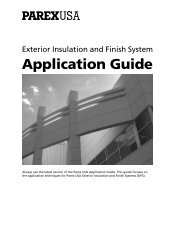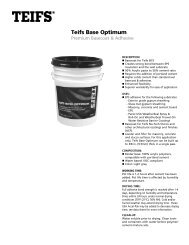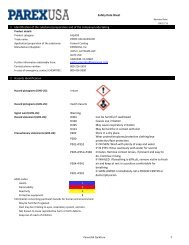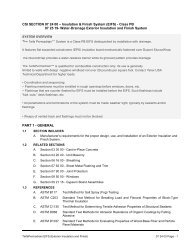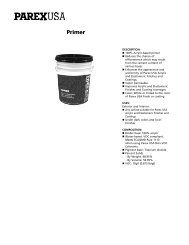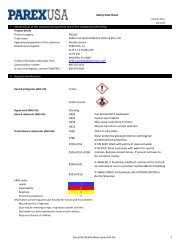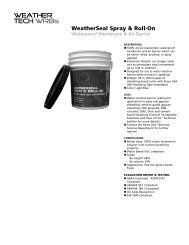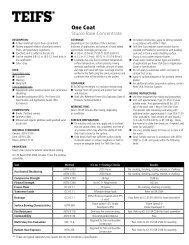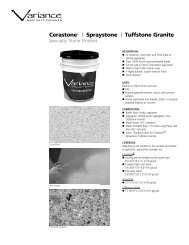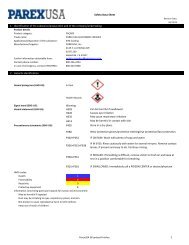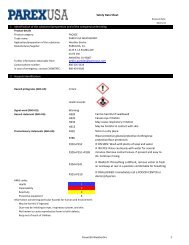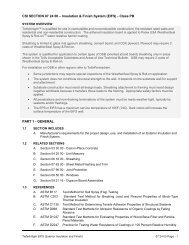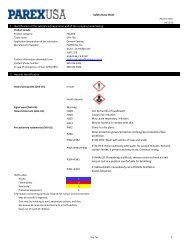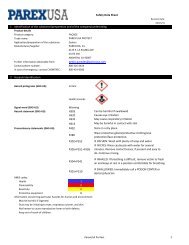SDS: Parex USA Metallic Coating
SDS: Parex USA Metallic Coating
SDS: Parex USA Metallic Coating
You also want an ePaper? Increase the reach of your titles
YUMPU automatically turns print PDFs into web optimized ePapers that Google loves.
1<br />
Identification of the substance/preparation and of the company/undertaking<br />
Product details<br />
Product category:<br />
Trade name:<br />
Application/preparation of the substance:<br />
Manufacturer/Supplier:<br />
Further information obtainable from:<br />
Contact phone number:<br />
In case of emergency, contact CHEMTREC:<br />
FAÇADE<br />
PAREX <strong>USA</strong> METALLIC COATING<br />
FAÇADE<br />
PAREX<strong>USA</strong>, Inc.<br />
4125 E. LA PALMA AVE<br />
SUITE 250<br />
ANAHEIM, CA 92807<br />
pedro.paredes@parexusa.com<br />
800-226-2424<br />
800-424-9300<br />
Safety Data Sheet<br />
Revision Date:<br />
04/15/15<br />
2<br />
Hazards identification<br />
Hazard pictograms (GHS-US):<br />
Irritant<br />
Health Hazards<br />
Signal word (GHS-US):<br />
Hazard statement (GHS-US):<br />
Precautionary statements (GHS-US):<br />
Warning<br />
H303<br />
H320<br />
H335<br />
H313<br />
P402<br />
P280<br />
P302+P352<br />
P305+P351+P338<br />
P304+P341<br />
Can be harmful if swallowed<br />
Causes eye irritation<br />
May cause respiratory irritation<br />
May be harmful in contact with skin<br />
Store in a dry place.<br />
Wear protective gloves/protective clothing/eye<br />
protection/face protection.<br />
IF ON SKIN: Wash with plenty of soap and water<br />
IF IN EYES: Rinse cautiously with water for several<br />
minutes. Remove contact lenses, if present and easy to<br />
do. Continue rinsing.<br />
IF INHALED: If breathing is difficult, remove victim to fresh<br />
air and keep at rest in a position comfortable for breathing<br />
P301+P310<br />
HMIS codes:<br />
Health 1<br />
Flammability 0<br />
Reactivity 0<br />
Protective equipment<br />
B<br />
Information concerning particular hazards for human and environment:<br />
May be harmful if ingested.<br />
Dust may be irritating to eyes, respiratory system, and skin.<br />
Not known to cause reproductive harm or birth defects.<br />
Keep out of reach of children.<br />
IF SWALLOWED: Immediately call a POISON CENTER or<br />
doctor/physician<br />
<strong>Parex</strong><strong>USA</strong> <strong>Metallic</strong> <strong>Coating</strong> 1
3 Composition/information on ingredients<br />
Chemical characterization<br />
Dangerous components:<br />
CAS #<br />
1317-65-3<br />
51200-87-4<br />
Name<br />
Calcium Carbonate<br />
4,4 Dimethyloxazolidine<br />
Exposure Limit<br />
OSHA TW (Respirable)<br />
OSHA TWA (total)<br />
ACHIG TWA (Respirable)<br />
OSHA PEL (Respirable)<br />
none established<br />
5 mg/m 3<br />
15 mg/m 3<br />
3mg/m 3<br />
3mg/m 3<br />
Additional information:<br />
n/a<br />
4<br />
First aid measures<br />
General information:<br />
n/a<br />
After inhalation:<br />
After skin contact:<br />
After eye contact:<br />
Remove to fresh air. If not breathing, give artificial respiration. If having difficulty<br />
breathing, give oxygen. Get immediate medical attention.<br />
Wash affected area thoroughly with soap and water. Remove contaminated clothes and<br />
launder before re-use.<br />
Immediately flush eyes with plenty of water for at least 15 minutes. Get medical attention.<br />
After swallowing:<br />
Do not induce vomiting. Get medical attention immediately.<br />
5<br />
Fire-fighting measures<br />
General information:<br />
Flash point:<br />
Suitable extinguishing agents:<br />
Water- based product.<br />
n/a<br />
For the dried product, use carbon dioxide, dry chemical, or alcohol foam.<br />
Hazardous combustion products:<br />
Protective equipment:<br />
Incomplete combustion of dried product can yield low molecular weight hydrocarbons,<br />
carbon monoxide, and carbon dioxide.<br />
n/a<br />
Firefighting instructions:<br />
Respiratory equipment should be worn to avoid inhalation of combustion products. Water<br />
should not be used except as fog to keep nearby containers cool. Water may be used to<br />
cool closed containers to prevent pressure build-up and exposed to extreme heat.<br />
6<br />
Accidental release measures<br />
Measures for environmental protection:<br />
Keep spilled products out of sewers, streams, and water systems.<br />
Measures for cleaning/collecting:<br />
For dry material, collect by sweeping and scooping. Transfer collected material to a<br />
container, being careful to minimize creation of dust. For wet material, scoop material up<br />
and transfer to an open container. Allow material to dry before disposal.<br />
Additional information:<br />
See section 13 and section 15 for specific regulatory information concerning this product.<br />
7<br />
Handling and storage<br />
Handling:<br />
Wear appropriate protective equipment when working with this product. Promptly remove dusty clothing, or clothing wet with product<br />
mix, and launder before re-using. Wash thoroughly after exposure to product mixtures. Keep out of reach of children.<br />
Storage:<br />
Store in a dry location. Atmospheric temperatures and pressures do not affect the shelf life of this product.<br />
<strong>Parex</strong><strong>USA</strong> <strong>Metallic</strong> <strong>Coating</strong> 2
8<br />
Exposure controls/personal protection<br />
Additional information about design of technical facilities: n/a<br />
Ingredients with limit values that require monitoring at the workplace:<br />
CAS #<br />
Name<br />
Exposure Limit<br />
OSHA TW (Respirable)<br />
1317-65-3<br />
Calcium Carbonate<br />
OSHA TWA (total)<br />
ACHIG TWA(Respirable)<br />
OSHA PEL (Respirable)<br />
51200-87-4<br />
4,4 Dimethyloxazolidine none established<br />
5 mg/m 3<br />
15 mg/m 3<br />
3mg/m 3<br />
3mg/m 3<br />
WARNING! If you scrape, sand, or remove old paint, you may release lead dust. LEAD IS TOXIC. EXPOSURE TO LEAD DUST CAN CAUSE<br />
SERIOUS ILLNESS, SUCH AS BRAIN DAMAGE , ESPECIALLY IN CHILDREN. PREGNANT WOMEN SHOULD ALSO AVOID EXPOSURE. Wear a NIOSHapproved<br />
respirator to control lead exposure. Clean up carefully with a HEPA vacuum and a wet mop. Before you start, find how low to<br />
protect yourself and your family by contacting the National Lead Hotline at 1800-424-LEAD or log onto www.epa.gov/lead<br />
Additional information:<br />
The lists valid during the making were used as a basis.<br />
Personal protective equipment:<br />
ventilation<br />
respiratory protection<br />
eye protection<br />
skin protection<br />
Use local exhaust. General exhaust acceptable if the exposure to materials above is<br />
maintained below applicable exposure limits. Refer to OSHA Standards 1910.94, 1910.107,<br />
and 1910.108.<br />
If personal exposure cannot or may not be controlled below applicable limits by<br />
ventilation, wear properly fitted respirator approved by NIOSH/MSHA for protection<br />
against materials described above.<br />
Wear safety glasses to reduce the potential for eye contact.<br />
Prevent prolonged or repeated contact by using rubber gloves and appropriate protective<br />
clothing.<br />
9<br />
Physical and chemical properties<br />
General information:<br />
form<br />
color<br />
odor<br />
pH<br />
Change in condition:<br />
melting point/melting point range<br />
boiling point/boiling point range<br />
evaporation rate:<br />
vapor density:<br />
Specific gravity:<br />
Solubility in/Miscibility with water:<br />
Density at 20°C:<br />
VOC:<br />
Fluid<br />
Colored<br />
Mild ammonia<br />
8.0-10.0<br />
32'F<br />
190-212'F<br />
Slower than ether<br />
Heavier than air<br />
1.08<br />
dispersible<br />
9. lb/gal<br />
12 g/L (0.1006 lb/gal)<br />
<strong>Parex</strong><strong>USA</strong> <strong>Metallic</strong> <strong>Coating</strong> 3
10 Stability and reactivity<br />
Conditions to be avoided:<br />
Chemical stability:<br />
Materials to be avoided:<br />
Hazardous polymerization:<br />
None known<br />
Stable<br />
None known<br />
Will not occur<br />
Dangerous decomposition products:<br />
Will not spontaneously occur. By Fire- low molecular weight hydrocarbons, carbon dioxide and monoxide.<br />
11<br />
Toxicological information<br />
Acute toxicity:<br />
crystalline silica (quartz, cristobalite)<br />
Considered a known human carcinogen by Federal (OSHA) and advising health agencies<br />
(IARC, NIOSH, and NTP). Additionally, crystalline silica can cause a lung condition known as<br />
silicosis after long term exposure to dusts containing crystalline silica. Exposure of workers<br />
to crystalline silica containing dusts is specifically regulated by OSHA. The use of a correctly<br />
fitted, NIOSH approved respirator suitable for use against crystalline silica inhalation is<br />
essential for minimizing exposure to this danger.<br />
mineral dusts<br />
Some items mentioned in Section 8 are considered mineral dusts by OSHA and a correctly<br />
fitted, NIOSH approved respirator is required when working with this product.<br />
Primary irritant effect:<br />
on the skin<br />
on the eye<br />
Exposure of skin to wet product may cause chemical burns. Symptoms of exposure may<br />
take several hours to manifest.<br />
Exposure of eyes to wet product may cause chemical burns and blindness. Exposure to<br />
airborne dust can cause immediate or delayed irritation or inflammation.<br />
through ingestion<br />
through inhalation<br />
Additional toxicological information:<br />
May be harmful if ingested.<br />
Dust generated during handling this product may cause irritation to the respiratory tract.<br />
n/a<br />
12<br />
Ecological information<br />
Elimination (persistence and degradability):<br />
Behavior in environmental systems:<br />
Mobility and bioaccumulation potential:<br />
General notes:<br />
n/a<br />
n/a<br />
n/a<br />
n/a<br />
13<br />
Disposal considerations<br />
Product recommendation:<br />
This product must be disposed of in accordance with applicable local, state and federal<br />
regulations. Where possible, it is best to use up any excess material.<br />
Uncleansed packaging recommendation:<br />
Disposal must be made according to official regulations.<br />
<strong>Parex</strong><strong>USA</strong> <strong>Metallic</strong> <strong>Coating</strong> 4
14 Transport information<br />
Land transport USDOT<br />
Sea transport IMDG<br />
Air transport IATA/ICAO<br />
Not classified as a dangerous good under transport regulations<br />
Not classified as a dangerous good under transport regulations<br />
Not classified as a dangerous good under transport regulations<br />
15<br />
Regulatory information<br />
US Federal regulations<br />
CERCLA, section 103 (40CRF302.4)<br />
This product contains the following toxic chemicals that require notification of the National Response Center of releases of<br />
quantities of hazardous substances equal to or greater than the Reportable Quantities (RQ):<br />
No reportable quantities are present.<br />
Clean Air Act, section 112<br />
This product contains the following components present at or above the minimum level and listed as Hazardous or Extremely<br />
Hazardous Air Pollutants:<br />
No reportable quantities are present.<br />
SARA, section 302 (40CFR355.30) and section 304 (40CFR355.40)<br />
This product contains the following items that require emergency planning based on Threshold Planning Quantities (TPQ) or release<br />
reporting based on RQ:<br />
SARA, section 311/312 (40CFR370.21) Hazard classification for this product<br />
Fire: No<br />
Acute health: No<br />
Pressure generating: No<br />
Chronic health: No<br />
4,4 Dimethyloxazolidine CAS # 51200-87-4<br />
Theoretical VOC for this product = 12g/L (0.1006lb/gal)<br />
Reactivity: No<br />
SARA, section 313 (40CFR372.65)<br />
This product contains the following substances subject to the reporting requirements of Section 313 of Title III of the Superfund<br />
Amendment and Reauthorization Act of 1986:<br />
EPA VOC regulations<br />
TSCA<br />
OSHA<br />
No reportable quantities are present.<br />
All components of this product are listed, or are exempt from listing on the TSCA inventory.<br />
This Safety Data Sheet is prepared to comply with the United States Occupational Safety and Health Administration (OSHA) Hazard<br />
Communication Standard (29 CFR1910.1200). Unlisted ingredients are not 'hazardous' per OSHA standards.<br />
In addition to items listed in Section 11, this product contains the following items that are specifically regulated by OSHA. Exposure<br />
limits may be found in Section 8.<br />
No reportable quantities are present.<br />
State regulations<br />
California<br />
Warning - The following chemicals are present in this coating product in small amounts. These chemicals are listed by the California<br />
EPA as materials known to the State of California to cause cancer, (and/or) birth defects, (and/or) other reproductive harm:<br />
16<br />
Calcium carbonate CAS # 1317-65-3<br />
Other information<br />
The information and recommendation set forth herein are believed to be accurate. Because some of the information used to prepare this<br />
document is derived from information provided to PAREX<strong>USA</strong>, Inc. from its suppliers, and because PAREX<strong>USA</strong>, Inc. has no control over the<br />
conditions of handling and use, PAREX<strong>USA</strong>, Inc. makes no warranty, expressed or implied, regarding the accuracy of the data or the results to<br />
be obtained from the use thereof and assumes no responsibility from use or reliance thereon. It is the responsibility of the user of<br />
PAREX<strong>USA</strong>, Inc. products to comply with all applicable federal, state, and local laws and regulations.<br />
<strong>Parex</strong><strong>USA</strong> <strong>Metallic</strong> <strong>Coating</strong> 5



